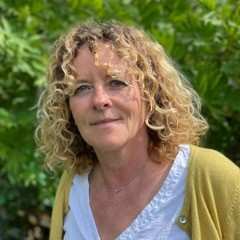Introducing Beverly Coghlan: Research Office for the EMDR Association UK

Ben Wright (BW) (Chair of the Science and Research Committee): Please would you tell us what appealed to you about the role of research officer?
Beverly Coghlan (BC): I have been involved in clinical research in one form or another since I graduated from university back in the late eighties. I have been at my happiest and most fulfilled when I combine my clinical work with research.
I originally trained as a general nurse at Bart’s (as it was then). All starched aprons and ridiculous hats and I loved it but wanted to delve deeper into science, and so I read for a physiology degree at UCL. I had a huge advantage over the other students on my course because I had clinical experience which made the application of the science more relevant. After graduating I was the nurse-in-charge at the Guy’s Drug Research Unit doing Phase I studies, and I then went on to work with Wellcome as a clinical research associate. I moved through various pharmaceutical companies gaining experience in all aspects of clinical trials from protocol writing, case record form design, monitoring, data collection and report writing. I trained in ICH-GCP (good clinical practice) and was tasked with introducing that way of working to a medical devices company. It was quite a challenge. I studied for a masters in biopharmacy at KCL and eventually secured a place to undertake a DPhil at Oxford. Life intervened and I did not complete that because having babies got in the way, but again it gave me even more experience in research.
About 15 years ago I retrained, firstly completing another master’s in health psychology at Southampton University and then undertaking postgraduate studies in CBT and psychological therapies. I took up a research fellow post in the Department of Primary Care Medicine at Southampton working on an extended programme investigating the non-specific (placebo) effects of treatment interventions.
So, when the post of research officer was advertised it promised to bring together my love of research and my passion for trauma psychotherapy using EMDR.
BW: What are you looking forward to most in your new role?
BC: The Association’s strategic objectives are clearly defined and most important for me is to develop the evidence-base for EMDR therapy and the knowledge and skills of our members. I am looking forward to supporting research initiatives by members, academic institutions and other organisations with an interest in EMDR. One of the challenges will be to encourage people to undertake research projects that are largely in line with the Association’s desire to enlarge the evidence base for EMDR in PTSD, psychosis and depression. I am looking forward to meeting with researchers to discuss projects at an early stage and to help them get the projects off the ground. Mark Brayne has already done a fantastic job of collecting information on all the people who are currently conducting research in the UK, and I intend to build on his work. to make that information accessible for potential collaborations.
Part of my remit is to provide our members with learning opportunities, access to resources and encouragement to join specialist groups and other learning or communication forums. To this end, I will be developing a FAQ about research that will be available on the website. I want people to enjoy the research aspect as much as I do because it really does enrich the clinical work that we do. Another thing that members can do to get involved in research is to volunteer as clinical trial therapists and supervisors. Research studies need therapists to contribute clients and to conduct therapy according to the protocol. Training is always provided, and the work therapists do is most often paid for. Acting as a clinical trial therapist gives people the opportunity to contribute their own experience and skills without having to design their own research. It is a very valuable contribution towards developing the evidence-base for EMDR. Supervisors are always needed for the trial therapists, either to supervise the client work or to conduct fidelity checks on the trial protocol. I hope to set up a bank of supervisors who would be willing to undertake this valuable work.
BW: What projects are currently ongoing?
BC: I am super excited about the launch of a searchable UK EMDR Association database in time for the new academic year. The database will be fully searchable and will contain indexed references of published EMDR papers. This will be freely available to all members. It builds on the original idea of the Francine Shapiro Library database by being comprehensive, structured in a format to support referencing and giving links to locate the original articles. We will keep the database up to date and aim to make it easy to use. Members will be able to search for articles to support their clinical work, and researchers will have a go-to database that holds every study about EMDR.
Attachment Informed EMDR is a hot topic and funding has been secured for a pilot study to investigate the effectiveness of the technique when delivered remotely. We also have an international collaboration with ‘sister’ EMDR Associations to correct and update the EMDR entry on Wikipedia.
Several people have already contacted me with ideas about potential research projects and I would encourage anyone who has an idea or who would like to get involved to please contact me by email:mailto:researchofficer@emdrassociation.org.uk




